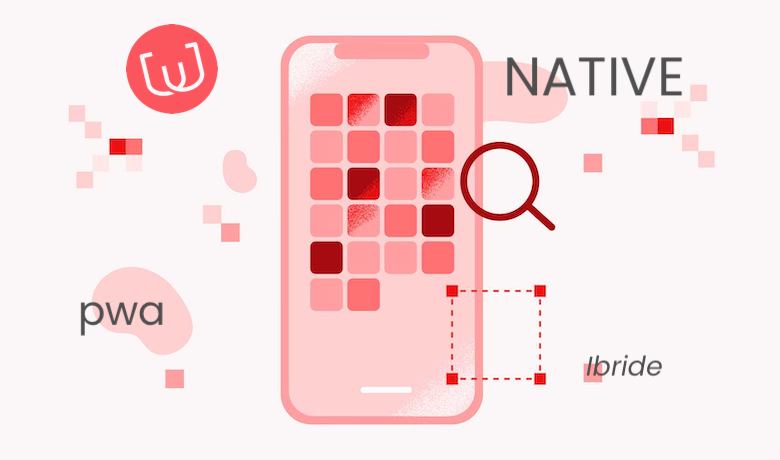Since smartphones have become part of our daily lives, developers have increasingly focused on developing Apps. This term, short for “application“, has quickly become part of everyday language, and today there are many companies that develop this particular software, with an extremely intuitive interface, specifically to offer users an easy and immediate user experience through which they can quickly access their services.
If you too own a business and want to reach your audience through the development of an App, you should know that when addressing this topic, it is necessary to primarily distinguish three types, which determine both the development methodology and the usage by the public. These three types are Native Apps, PWA Apps, and Hybrid Apps. Let’s see the definition for each of them and which one to choose for your business.
Native App
We speak of Native Apps when their development is specifically designed for a particular operating system. From the idea to the realization of the product, therefore, the codes, graphics, interface, and all the functions of the App are created to work on the reference operating system. In most cases, this is the Android and iOS operating system. With this type of development, problems of malfunctioning, graphical glitches, and any errors that an application not specifically studied for an operating system could create are avoided. Once the environment in which they will run is defined, an extremely efficient product can be created and made to interact with all the other functions of the devices that integrate such an environment, such as push notifications and background operation.
PWA App
PWA is the acronym for Progressive Web App. Unlike Native Apps, PWA types are not developed for a specific operating system, but to work through the web like any site opened from a normal browser. It is, therefore, a development that is quite different from Native Apps, which aims to allow the use of the App from any device, regardless of the operating system running inside it. Generally, PWAs are not physically installed inside the device but must be opened by visiting a web browser. However, when opening the corresponding page, the user is not faced with a classic website but a version that has an interface similar to that of an App.
Hybrid App
The situation is different for Hybrid Apps. Since it is a mixture of the two, Hybrid Apps are physically installed on the device that uses it, but their graphic interface and functioning are similar to those of PWA Apps. Generally, the user experience is not very different from what they would have accessing the application through the browser; however, based on the operating system, developers can make graphical and interface improvements that allow for more comfortable use.

Advantages and disadvantages of these Apps
In order to decide which type of enterprise App to develop, here are a series of advantages and disadvantages that each of these types of Apps presents.
Native Apps Advantages
- Always clear and easy-to-manage interface as it is developed for the hosting operating system;
- integration with other device functions, such as Push notifications, background processing, battery saving, updates, etc.;
- fast loading times;
- also work offline.
Native Apps Disadvantages
- Occupies memory space as they require installation;
- their development requires high costs.
PWA Apps Advantages
- Development generally requires lower costs;
- does not occupy memory space as it is accessed only through the web;
- works on any operating system;
- allows for temporary deletion of sensitive data.
PWA Apps Disadvantages
- Sometimes present graphic glitches;
- always require a network connection (do not work offline);
- integrations with other system functions are not 100% effective: Push notifications, updates, etc.
Hybrid Apps Advantages
- Simpler to develop and therefore can be launched on the market more quickly;
- updates are faster and do not require user installation;
- often able to integrate with common devices.
Hybrid Apps Disadvantages
- Do not work offline;
- User Experience is not always effective.
Which App to choose for your company
Therefore, the fundamental question remains, which App to choose for your company. In this case, it’s important to say that the choice is entirely personal and depends on several factors. Deciding whether to develop a native, hybrid, or PWA App depends a lot on the needs and results you want to achieve. Here are some aspects to consider.
Costs
If the
Costs
If the budget available is not very high, the development of a native App is not recommended since it requires a team of developers working specifically for this purpose, as well as an initial budget that not all companies can afford. There are tools available online to develop your own App, but they are not recommended if you want to invest many resources in it. If the budget is low, the choice should fall on PWA Apps, initially evaluating the development of a hybrid App based on available resources.
Target audience
The target audience is another aspect to consider. The development of a game, for example, cannot disregard the choice of a native App, as well as an App that aims to keep users updated on the latest news or includes home banking functions. Depending on the type of audience you want to reach, you should also consider how willing they are to download an App on their smartphone or tablet. A younger audience may not have problems, but older age groups may prefer web Apps.
Development time
Development time is closely related to costs. Native Apps are the ones that require longer development times; the same does not apply to PWA or hybrid Apps, which can be developed in shorter times.
Functionality
Finally, an extremely important aspect is related to functionality. Only by choosing a native App can you insert all the desired functionalities. If, on the other hand, you don’t focus much on this aspect and your company’s App aims, for example, at simply reading content without particular interaction from the audience, you can opt for a hybrid or PWA App.
Contact us now to not miss this opportunity!





